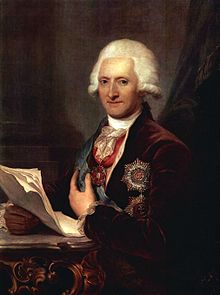- Jacob Sievers
-
Count Jacob Sievers (August 30th, 1731 in Wesenberg [now Rakvere, Estonia] - July 23rd, 1808 in Bauenhof, Governorate of Livonia [near what is now Valmiera, Latvia]) was a Russian statesman and a reformer of the empire.
After serving the Russian army during the Seven Years' War as quartermaster general, Catharine II appointed him governor of Novgorod in 1764. He introduced the cultivation of potatoes to Russia, regulated the postal services, and was instrumental in the abolition of torture in 1767.
Based on Sievers' initiative, the provincial government reform was instituted; he was himself appointed general governor of Novgorod, Tver and Pskov. He was Russian ambassador to Poland and led the second and third partition of the kingdom. Czar Paul appointed him senator in 1796; in 1797 he became head of the new department for water communications. He was knighted in 1798.
In Sievers' honor, Alexander I named the channel that connects the outlet of the Msta river with the Volkhov river the Sievers channel.
Literature
- Blum, Karl Ludwig: Ein russischer Staatsmann, Denkwürdigkeiten des Grafen von Sievers, Leipzig 1857-58, 4 Bände
- Blum, Karl Ludwig: Graf Jacob Johann von Sievers und Russland zu dessen Zeit. Leipzig; Heidelberg: Winter, 1864
- Jones, Robert E: Provincial Development in Russia. Catherine II and Jacob Sievers. Rutgers University Press 1984
Categories:- Imperial Russian politicians
- Baltic-German people
- History of the administrative divisions of Russia
- History of Russia
- Russian nobility
- 1731 births
- 1808 deaths
- People from Rakvere
- Recipients of the Order of the White Eagle (Poland)
- Recipients of the Order of Saint Stanislaus
- Recipients of the Order of St. Andrew
Wikimedia Foundation. 2010.

